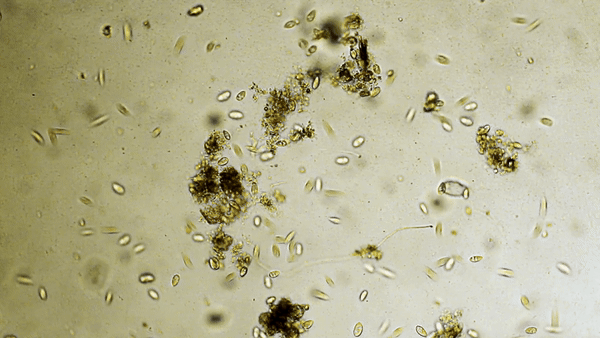Important facts about the efficiency of organic fertilizers


Most organic fertilizers release about 60% of their nutrients in the first year, as natural soil microorganisms break down organic material. However, nutrient release can be delayed in soils lacking these microorganisms, especially if damaged by extensive pesticide and chemical fertilizer use.
Agrivari addresses this by adding beneficial microorganisms to accelerate mineralization, ensuring 100% nutrient release in the first year. These microorganisms also help mobilize nutrients within the soil, enhancing nutrient storage in the humus layer.

Advantages:
-
Long-Term Nutrient Supply: Nutrients are gradually released, providing sustained nourishment, ideal for perennial crops and plants with steady nutrient needs.
-
Reduced Risk of Nutrient Loss: The slow release reduces nutrient leaching into deeper soil layers or loss through evaporation.
-
Enhances Soil Structure and Humus Formation: Slow mineralization promotes humus buildup, improving soil structure and water retention.
Disadvantages:
-
Delayed Effect: The impact is slower, which can be a drawback for plants with immediate nutrient demands.
-
Less Suitable for Short Growth Cycles: For crops with short growth periods, the gradual nutrient release may not be sufficient.

Advantages:
-
Immediate Nutrient Availability: Nutrients are immediately accessible, which is beneficial for plants with high nutrient demands during specific growth phases.
-
Effective for Acute Deficiencies: Quickly corrects visible nutrient deficiencies.
-
Ideal for Short-Term Crops: Fast-growing plants and annual crops benefit from the quick nutrient availability.
Disadvantages:
-
Higher Risk of Leaching: Rapid nutrient release increases the risk of leaching into groundwater, especially in sandy soils or with heavy rainfall.
-
No Long-Term Effect: Since nutrients are quickly consumed, multiple applications may be needed, increasing costs and providing less support for soil structure.

The best of both worlds
AgriElite combines the benefits of both fast- and slow-release fertilizers, eliminating their drawbacks.
Its highly active microbiology ensures rapid nutrient availability while its unique organic blend provides long-term nutrient release. AgriElite’s microbes also unlock existing soil reserves of hard-to-dissolve phosphates and nitrogen, reducing the need for fertilizer in the following year
Always keep in mind:
Mineral fertilizers should be used precisely to correct acute nutrient deficiencies or support specific growth stages, like flowering or stem formation, but never as a complete solution.
Organic fertilizers are typically applied to strengthen soil flora and fauna, serving as a food source for microorganisms that, in turn, make nutrients available to plants.
Microbiological fertilizers already contain essential microorganisms that partially mineralize the organic material during production. This allows for immediate nutrient availability, with the remaining nutrients gradually released over time for sustained plant support.
Does it makes sense to use organic fertilizers instead of chemical ones?

The answer is absolutely. The extensive use of mineral fertilizers and pesticides have destroyed the soil living which stabilizes the ph value and create the high potential humus storage.
We must recognize the value of humus and fertile soil:
Just 1% more humus can store an additional 400,000 liters of water per hectare, supporting plants during drought and controlling runoff during heavy rains.
Humus filters rainwater, reducing nitrate leaching into groundwater, especially in protected water areas.
Each 1% of humus stores up to 2,500 kg of nitrogen, decreasing the need for mineral fertilizers, which is beneficial for both farmers and the environment.
Humus-balanced soils provide well-rounded nutrition, making plants more resilient to diseases.
Humus helps lock carbon in the soil, offering a sustainable way to fight climate change.

N
N
N
N
N
How to incrase the leaf size to absorb more sunlight and transport glucose to the roots?

.jpg)
Our AgriElite Booster is a plant protection concentrate that combines beneficial microorganisms with specific minerals. These minerals adhere just beneath the leaf surface, strengthening the plant’s vitality and resilience. By promoting an increase in leaf surface area, the Booster enhances photosynthesis, accelerating the plant’s metabolic processes through increased sunlight absorption, which supports robust growth.
The presence of microorganisms on the leaves is crucial as they form a natural protective barrier against harmful pathogens like fungi and bacteria. By competing with these harmful microbes or producing active defense compounds, they help defend the plant. Additionally, these microorganisms can stimulate the plant's immune system, making it more resilient to environmental stress.
Furthermore, the microorganisms on the leaf surface contribute to nutrient uptake and the breakdown of organic matter, providing the plant with essential nutrients. This comprehensive approach creates a dual layer of protection: AgriElite biofertilizer enriches the soil from below, while our Booster fortifies the plant from above, fostering healthier, more resilient growth and enhancing overall plant health.

